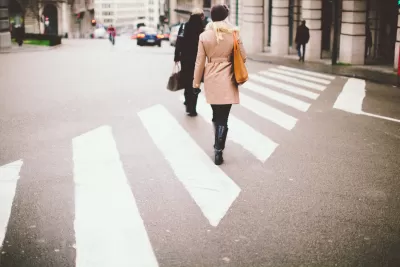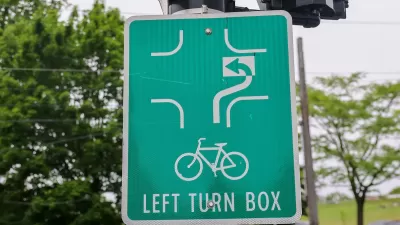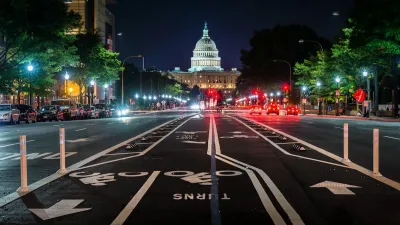After 11 years, the federal transportation manual is getting an update to reflect the rise of autonomous vehicles, shared mobility, and modernized pedestrian infrastructure.

The Federal Highway Administration has extended the public comment period for its update of the Manual of Uniform Traffic Control Devices (MUTCD). The manual, which hasn't been updated since 2009, "sets federal standards for the signs, markings and signals that help instruct road users on how to safely move through our communities."
As reported by Kea Wilson in Streetsblog, advocates hope that the revised manual will take into account new programs and mobility options such as bike share, scooters, and autonomous cars and implement higher standards for protecting vulnerable users. Rather than prioritize vehicle throughput above safety, planner Don Kostelec told Streetsblog, the manual should include the highest standards for safety at crosswalks and other vulnerable interaction points.
The main reason for the manual's upcoming revision seems to be the rise of autonomous vehicles, "which rely on regular road markings to navigate complex road environments," but some of these changes may work in favor of bike advocates. For example, the revised manual calls for bike facilities to be "segregated from other vehicle traffic using physical barriers where practicable and that road markings are needed to denote the end of a bike lane that is merged with traffic" in order to accommodate "machine vision." Such policy changes in manuals like the MUTCD, argues BikeUtah program director Mike Wiltsie, is "the best way we can bring about systemic change in our streets."
FULL STORY: Memo to Buttigieg: Fix Our National Traffic Control Standards

Alabama: Trump Terminates Settlements for Black Communities Harmed By Raw Sewage
Trump deemed the landmark civil rights agreement “illegal DEI and environmental justice policy.”

Study: Maui’s Plan to Convert Vacation Rentals to Long-Term Housing Could Cause Nearly $1 Billion Economic Loss
The plan would reduce visitor accommodation by 25% resulting in 1,900 jobs lost.

Planetizen Federal Action Tracker
A weekly monitor of how Trump’s orders and actions are impacting planners and planning in America.

Waymo Gets Permission to Map SF’s Market Street
If allowed to operate on the traffic-restricted street, Waymo’s autonomous taxis would have a leg up over ride-hailing competitors — and counter the city’s efforts to grow bike and pedestrian on the thoroughfare.

Parklet Symposium Highlights the Success of Shared Spaces
Parklets got a boost during the Covid-19 pandemic, when the concept was translated to outdoor dining programs that offered restaurants a lifeline during the shutdown.

Federal Homelessness Agency Places Entire Staff on Leave
The U.S. Interagency Council on Homelessness is the only federal agency dedicated to preventing and ending homelessness.
Urban Design for Planners 1: Software Tools
This six-course series explores essential urban design concepts using open source software and equips planners with the tools they need to participate fully in the urban design process.
Planning for Universal Design
Learn the tools for implementing Universal Design in planning regulations.
Caltrans
Smith Gee Studio
Institute for Housing and Urban Development Studies (IHS)
City of Grandview
Harvard GSD Executive Education
Toledo-Lucas County Plan Commissions
Salt Lake City
NYU Wagner Graduate School of Public Service





























